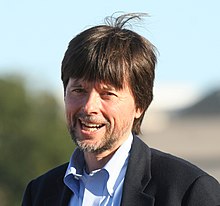Ken Burns
| Ken Burns | |
|---|---|

Burns in September 2007
|
|
| Born |
Kenneth Lauren Burns July 29, 1953 Brooklyn, New York, U.S. |
| Residence | Walpole, New Hampshire, U.S. |
| Alma mater | Hampshire College |
| Occupation | Filmmaker |
| Years active | 1981–present |
| Spouse(s) |
Amy Stechler Burns (m. 1982–93) Julie Deborah Brown (m. 2003) |
| Children | 4 |
Kenneth Lauren "Ken" Burns (born July 29, 1953) is an American filmmaker, known for his style of using archival footage and photographs in documentary films. His most widely known documentaries are The Civil War (1990), Baseball (1994), Jazz (2001), The War (2007), The National Parks: America's Best Idea (2009), Prohibition (2011), The Central Park Five (2012), and The Roosevelts (2014). He was also executive producer of both The West (1996, directed by Stephen Ives), and Cancer: The Emperor of All Maladies (2015, directed by Barak Goodman).
Burns's documentaries have been nominated for two Academy Awards and have won Emmy Awards, among other honors.
Burns was born on July 29, 1953 in Brooklyn, New York, the son of Lyla Smith (née Tupper) Burns, a biotechnician, and Robert Kyle Burns, at the time a graduate student in cultural anthropology at Columbia University in Manhattan. The documentary filmmaker Ric Burns is his younger brother. He is a distant relative of Scottish poet Robert Burns.
Burns's academic family moved frequently. Among places they called home were Saint-Véran, France; Newark, Delaware; and Ann Arbor, where his father taught at the University of Michigan. Burns's mother was found to have breast cancer when Burns was 3 and died when he was 11, a circumstance that he said helped shape his career; he credited his father-in-law, a psychologist, with a significant insight: "He told me that my whole work was an attempt to make people long gone come back alive." Well-read as a child, he absorbed the family encyclopedia, preferring history to fiction. Upon receiving an 8 mm film movie camera for his 17th birthday, he shot a documentary about an Ann Arbor factory. He graduated from Pioneer High School in Ann Arbor in 1971. Turning down reduced tuition at the University of Michigan, he attended Hampshire College, an alternative school in Amherst, Massachusetts, where students are graded through narrative evaluations rather than letter grades and where students create self-directed academic concentrations instead of choosing a traditional major. He worked in a record store to pay his tuition.
...
Wikipedia
